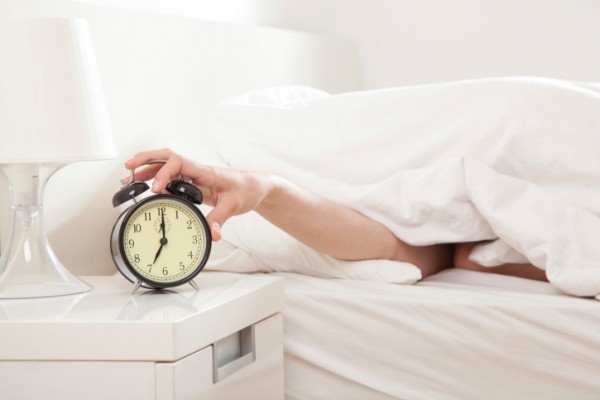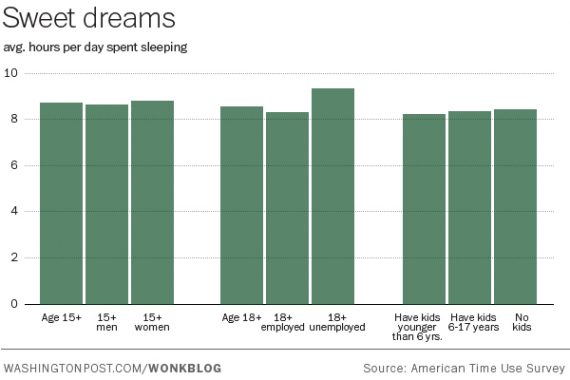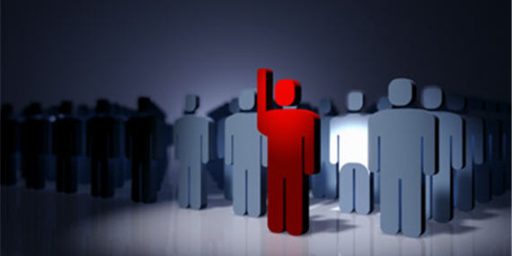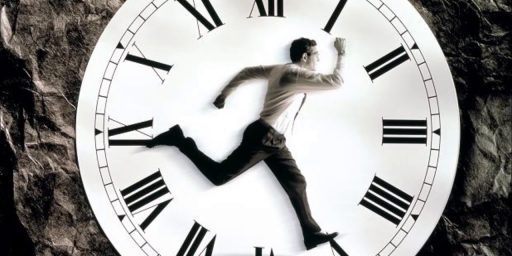Who Are These ‘Average Americans,’ And How Are They Getting Nine Hours Of Sleep A Night?
According to some surveys, Americans are getting a lot more sleep than they think they are. Really?
Yesterday, James Joyner wrote about a study detailing the reasons why Americans aren’t getting enough sleep, many of which sadly apply in my own life on a far too regular basis. On the other side of the coin, though, Wonkblog’s Christopher Ingraham makes note of recent studies showing that the average American gets nine hours of sleep a night:
How many hours did you sleep last night? If you are a basic American, like me, bASEDyou will probably grumble and mutter something disparaging about your kids before settling on a number somewhere in the 6-7ish hour range. In 2013, for instance, a Gallup poll reported that the average American slept 6.8 hours per night, with only a third hitting that golden 8+ hour figure.
But today the Bureau of Labor Statistics released their annual Time Use Survey, and it tells a different story. Among 11,000 Americans aged 15 and up, the average daily sleep total clocked in at 8 hours and 45 minutes, nearly two full hours higher than Gallup’s number.
And while it’s true that some groups get more sleep than others (looking at you, teenagers and old folks), that figure remains remarkably consistent across a variety of demographic categories. The only substantial difference is among the unemployed, who sleep for an hour longer than their employed counterparts. But no subgroup gets fewer than eight hours of sleep per night, according to the BLS, not even people with small kids. So what gives?
This chart shows the alleged consistency across demographic groups:
Based on that Gallup poll that Ingraham cites and other studies, along with anecdotal evidence, this results seem to come across as a surprising. The media, after all, is filled with stories about how Americans of all ages don’t get enough sleep. School systems have begun reconsidering their schedules due to the fact that early wake up times are meaning that teenagers are going to bed late and waking up early, and often end up falling asleep in class. And there are frequent reports of car accidents that are caused by people who are obviously fatigued, such as the recent accident on the New Jersey Turnpike that injured comedian Tracey Morgan, which was apparently caused by a truck driver who hadn’t slept in at least 24 hours prior to the accident. Given all of that and, well, the fact that so many of us feel tired all the time, the obvious question is, what gives?
As Ingraham notes, it may have something to do with how the survey was conducted:
To arrive at their sleep estimates, the BLS asks respondents what time they go to bed at night, and what time they get out of bed in the morning. But people do any number of, ahem, “non-sleep activities” in bed before they actually fall asleep at night, or after they wake up. These activities, which include things like personal grooming and reading in bed, are not reported separately in the BLS survey. “We may be capturing some of those activities right before they fall asleep,” Denton told me.
Another crucial caveat is that the BLS sleep estimates also include time spent napping. “If people report sleeping in the middle of the day, that would include average sleep,” Denton said.
Another difference between the BLS and Gallup numbers is how the question is asked. Gallup asks respondents to estimate how much sleep they get on average: “Usually, how many hours sleep do you get at night?” But the BLS survey asks people exactly when they were in bed on the previous day.
So which number is more accurate? On the one hand, you can see how asking people the specifics of their sleep habits may yield more accurate responses than general estimates. Americans tend to see busyness and perpetual fatigue as virtues, and we may exaggerate our sleeplessness for interviewers as a result.
Given that they’re both self-reporting, I’m not sure that either the Gallup or BLS studies can be said to be entirely accurate. In both cases, respondents are likely over-estimating the among of sleep that they get on a nightly basis, with the Gallup respondents straight-up just putting out an hourly number and BLS respondents counting as “sleep time” things that don’t necessarily count as sleep, such as staying up for an hour answering text messages, which doesn’t really count as sleep even if you’re doing it in bed.
Of the two, though, I’ve got to say that the BLS figure is the one that I find hard to believe, although it is based largely on anecdotal evidence. Since I’m usually awake no later than 5:00 in the morning no matter what time I may have fallen asleep, getting nine hours of sleep a night would mean going to sleep sometime around 8:30 the previous night. Now I’m not going to say I haven’t done that on occasion on night’s when I’m particularly exhausted, I also can’t say that it’s a common occurrence either. It’s more likely that I’ll be calling it a night around 10pm, which may mean I don’t actually fall asleep for another half hour or more. That adds up to maybe six or six and a half hours of sleep, which usually seems to be good enough on most days. Nine hours of sleep? That doesn’t happen unless I’m asleep far earlier than usual, or if its a weekend and I somehow have convinced my subconscious not to wake up at time not fit for man or beast. But those nights are out of the ordinary, and I am guessing that my experiences are not atypical.
So, if this BLS study is accurate, then there must be a lot of people out there getting a lot of sleep to bring that national average up to nine hours a night








Side note;
That accident on the pike reference has a few problems.
First, it is unclear where the “no sleep for 24 hours” bit came from.
Second, even if true, the accident occurred down by exit 8a, which is currently an area being expanded. The resulting traffic pattern has at least one accident a day in the area, usually fairly serious. (I drive through the area several times weekly)
For my ownself, I typically fall asleep between 8-9 pm, go to bed between 9-10 pm, get up between 3-4 am. I also tend to wake up 5,6,7 times a night (pain). Sometimes, I wake up at midnight or 1 am, and that’s it. The brain kicks into gear and no amount of wishing will turn it off. Other times, like last night, I will wake up, and then just spend the next several hours surfing the borderline between sleep and awake, never really being either one.
I have tried various things, some help a little bit, most not at all, and a few are actually detrimental. I have come to accept that I am just plain screwed.
@Eric Florack:
I was in New Jersey when that happened and, at least according to the local news, the reports about the trucker’s sleep came directly from statements he had made to police after the accident.
But, yea, that entire area from Exit 8A down to Exit 6 is kind of a mess right now with the expansion they’re doing. I’ve only been driving it during the day, I’m sure it’s more confusing at one in the morning.
The 9 hour figure came from the Bureau of Labor Statistics…you know, the same people who think the unemployment rate is 6.3%. That explains everything.
@Eric Florack: @Doug Mataconis:
Oh Dog, only been through Jersey a time or 2 and it is confusing everywhere, all the time. At night? In construction? Fuhgedaoubtit.
@OzarkHillbilly:
The Turnpike is a mess right now in the area I mentioned because they’re expanding the road by an additional three lanes in each direction. Until its finished sometime in November (I think) you never know what you’re gonna get when you drive through there
@Doug Mataconis: Drove up to MSP last summer for a visit with the sis. Construction everywhere. Could not believe it. Seemed like every road anywhere was having work done on it. When I mentioned it to my sis, she said, “Yes, it all has to be done in the summer because of our winters.”
Duuuuhhhhhhh.
@Doug Mataconis:
From what I understand, the trucker is disputing the 24-hours-without-sleep statement that the police have told people, and stating that he never said that. Unfortunately, it’s going to be hard to know the truth one way or the other.
@Ben:
The prosecutor in question here has a reputation for over-charging. I wouldn’t be surprised to see this ultimately either plead down or result in a conviction on a lesser included offense
…the BLS would have done much better had they labeled their graphs “Time people spend in bed.” That’s not sleeping.
(They’re also incredibly pure-minded if they don’t think of the main activity most people do in bed when they’re not sleeping. I refer to, of course, reading.)
Then the study might as well be thrown out, it’s completely useless.
I’m not even concerned about the sex (which isn’t really happening much for parents with young kids). It’s the reading, the constant waking up and staring at the little light on the smoke detector for hours, getting up to go to the bathroom, wondering why your whole neighborhood thinks the 4th of July should be celebrated from mid-June to August with fireworks every night, disruptions from the children, etc.
In other words, based on their study I get a good 8 hours. In reality, I’m actually *asleep* for roughly 6. And I don’t think I’m exaggerating one or another.
@Franklin:
Right. I got to bed at 10 and get out of bed at 6:30. I do not, however, get 8.5 hrs of sleep. I get 7… sometimes 6.
I get 8.5 hours of rest, but maybe 7 of sleep. I bet that’s fairly typical.
People are terrible at estimating the total amount of sleep they get. Most people overestimate the amount of time they’re awake during the night. If you wake up three times for five minutes each, you’ll look back on the night and say that you woke up a lot, remember staring at the clock a lot…maybe a half hour or an hour. Nappers typically underestimate the time they spend asleep. And everyone’s a complainer, so we remember the latest time we got to sleep recently and say that’s when we fall asleep on average. And on the other end, if you set the alarm for 6:30 and bang on the snooze button until 7:00, you’ll say that you wake up at 6:30.
Self-reporting time spent unconscious is, by definition, problematic.
@grumpy realist: Oops, hadn’t seen your comment (maybe I took a long time writing mine). But agreed 100%.
No idea how anyone can get solid, regular eight hours of sleep. A twelve hour work day is unusually short for me, and time between my head hitting the pillow and the alarm sounding is never more than seven hours.
They’ve unfortunately gone out of business, but there was a company called Zeo who sold a sleep monitor (a really good one, using an EEG.) They had really high quality data about when people were actually asleep and awake. If I remember their blog correctly, they said their customers clocked in at something between 7-7.5 hours of actual sleep a night, with a standard deviation of about 1 hour. There’s still some self-selection bias in there, but I’d at least trust the quality of their data more. Even the cheap sleep monitors like the Jawbone Up probably have better data than a self-reported bed time poll.
Lots of babies must’ve been included in dataset. Like. All babies.